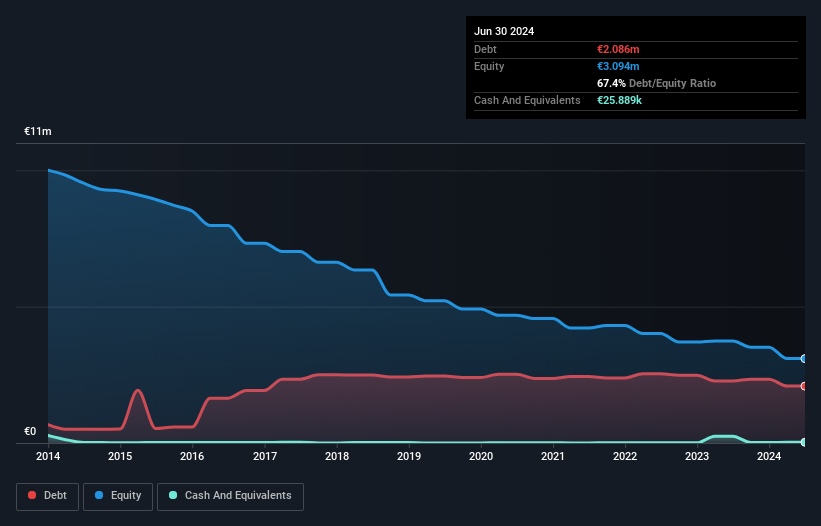David Iben put it well when he said, 'Volatility is not a risk we care about. What we care about is avoiding the permanent loss of capital.' It's only natural to consider a company's balance sheet when you examine how risky it is, since debt is often involved when a business collapses. We can see that N. Leventeris S.A. (ATH:LEBEK) does use debt in its business. But the more important question is: how much risk is that debt creating?
When Is Debt A Problem?
Debt is a tool to help businesses grow, but if a business is incapable of paying off its lenders, then it exists at their mercy. Ultimately, if the company can't fulfill its legal obligations to repay debt, shareholders could walk away with nothing. However, a more usual (but still expensive) situation is where a company must dilute shareholders at a cheap share price simply to get debt under control. Of course, the upside of debt is that it often represents cheap capital, especially when it replaces dilution in a company with the ability to reinvest at high rates of return. The first thing to do when considering how much debt a business uses is to look at its cash and debt together.
See our latest analysis for N. Leventeris
What Is N. Leventeris's Debt?
As you can see below, N. Leventeris had €2.09m of debt at June 2024, down from €2.27m a year prior. Net debt is about the same, since the it doesn't have much cash.

A Look At N. Leventeris' Liabilities
Zooming in on the latest balance sheet data, we can see that N. Leventeris had liabilities of €1.66m due within 12 months and liabilities of €1.79m due beyond that. On the other hand, it had cash of €25.9k and €174.6k worth of receivables due within a year. So its liabilities total €3.25m more than the combination of its cash and short-term receivables.
When you consider that this deficiency exceeds the company's €2.45m market capitalization, you might well be inclined to review the balance sheet intently. Hypothetically, extremely heavy dilution would be required if the company were forced to pay down its liabilities by raising capital at the current share price. When analysing debt levels, the balance sheet is the obvious place to start. But it is N. Leventeris's earnings that will influence how the balance sheet holds up in the future. So when considering debt, it's definitely worth looking at the earnings trend. Click here for an interactive snapshot.
In the last year N. Leventeris wasn't profitable at an EBIT level, but managed to grow its revenue by 10%, to €840k. That rate of growth is a bit slow for our taste, but it takes all types to make a world.
Caveat Emptor
Importantly, N. Leventeris had an earnings before interest and tax (EBIT) loss over the last year. Its EBIT loss was a whopping €658k. Considering that alongside the liabilities mentioned above make us nervous about the company. It would need to improve its operations quickly for us to be interested in it. Not least because it had negative free cash flow of €496k over the last twelve months. So suffice it to say we consider the stock to be risky. When analysing debt levels, the balance sheet is the obvious place to start. However, not all investment risk resides within the balance sheet - far from it. For example, we've discovered 4 warning signs for N. Leventeris that you should be aware of before investing here.
At the end of the day, it's often better to focus on companies that are free from net debt. You can access our special list of such companies (all with a track record of profit growth). It's free.
Valuation is complex, but we're here to simplify it.
Discover if N. Leventeris might be undervalued or overvalued with our detailed analysis, featuring fair value estimates, potential risks, dividends, insider trades, and its financial condition.
Access Free AnalysisHave feedback on this article? Concerned about the content? Get in touch with us directly. Alternatively, email editorial-team (at) simplywallst.com.
This article by Simply Wall St is general in nature. We provide commentary based on historical data and analyst forecasts only using an unbiased methodology and our articles are not intended to be financial advice. It does not constitute a recommendation to buy or sell any stock, and does not take account of your objectives, or your financial situation. We aim to bring you long-term focused analysis driven by fundamental data. Note that our analysis may not factor in the latest price-sensitive company announcements or qualitative material. Simply Wall St has no position in any stocks mentioned.
About ATSE:LEBEK
N. Leventeris
Engages in production, marketing, and sale of wires and cables in Greece and internationally.
Slight risk with worrying balance sheet.
Market Insights
Community Narratives



